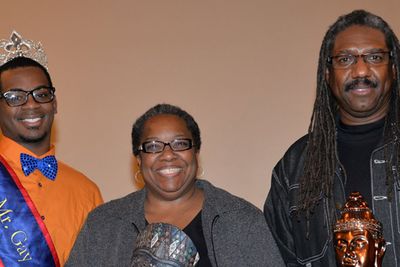By Hana Khalyleh, Feb. 12, 2015
The 2015 Invisible Heroes Awards were presented Feb. 3, 2015, at the Mount of Olives Lutheran Church. The recipients, Neal Lester, Donna McHenry and Robbie Fields, were selected by United Gay Informed Men of African descent (UGIMA) for recognition of their activism within the LGBT and African-American community.
According to Jason Green, co-facilitator of UGIMA, the awards are based on the principles of Kwanzaa and are awarded to prominent figures at the forefront of activism for racial and LGBT equality.
Neal Lester
Neal Lester, a straight ally and professor of English at Arizona State University, was the recipient of the Umoja (unity) award. He is the founding director of Project Humanities, which, according to its website, is a program that’s “a leader in local, national, international conversations about the breadth, depth, and value of humanities study and humanist practice and understanding across disciplines and communities.”
According to Lester, Project Humanities hosts workshops and events at ASU and across the valley, with the goal of spreading awareness about racial, gender, and sexual inequality.
“We need to find a way to talk about our differences in a way that doesn’t point fingers,” he said. “The idea is to get people to think in ways that they haven’t thought before.”
Lester has published on heteronormativity in children’s books, feminism, and intertwining conversations about race, gender and sexuality.
“The main challenge has to do with acknowledging that no community is monolithic,” he said. “Every individual is a member of multiple communities simultaneously.”
Battling oppression within any community, Lester said, begins with a shared understanding that one can suffer from racial or sexual inequality on an individual level while still fighting against oppression that the entire community endures.
“Just because there’s a shared oppression, doesn’t mean you are free from oppression from within that group,” he said, in regards to alienation and underrepresentation that the trans community and the African-American community sometimes endure within the LGBT community. “Once there’s awareness, there’s a sense that people who are socially aware are actually having this conversation in the community, and that is what makes the difference.”
Robbie Fields
Robbie Fields was the recipient of the “Kujichagulia” (self-determination) award for his constant activism and involvement with youth at one n ten.
Fields, who moved to Phoenix from Baltimore in 1995, has worked with one n ten for three years, two of those years as a volunteer. The most rewarding part of working with youth, he said, is seeing them reach out and engage more after finding friends in the community.
“At some point, you need to create your own family,” Fields said, regarding youth who don’t have a solid support system at home. “You need to seek out those who care and have your best interests at heart.”
When he learned he was receiving recognition from UGIMA, Fields said he was shocked, but overwhelmingly proud.
“I don’t think it’s about where you come from and what group you identify with or what your skin color is, I think if you want to, you can make yourself heard,” he said.
While progress has been made for African-American as well as LGBT youth to feel more proud in their own skin, Fields said, there are still steps to be taken.
“What has still lacked [in recent years] is education,” he said. “We still have a large group of our youth contracting HIV and AIDS. We, as adults, need to do more to change this.”
Donna McHenry
McHenry, a lesbian who was born and raised in Phoenix, is a former program coordinator for one n ten and has worked in juvenile corrections and behavior health, focusing on LGBT youth.
“As a foster parent, my concern is with the protections of LGBT youth in the system,” McHenry said, referring to youth who are on the brink of falling between the cracks. “I’ve seen children get sent back to DES or behavior health systems when [group homes] find out they’re gay. We need to have strong protections for the LGBT youth.”
Previously, McHenry was named a 2014 Youth Justice Leadership Institute Fellow and has been recognized for Outstanding Leadership from the Maricopa County African American Knowledge Network.
McHenry has spoken on a forum, The Rainbow and Race, as part of the “Healing Racism” series at Phoenix College and has presented as a guest speaker at ASU and Grand Canyon University.
Overall, she said, the Phoenix community is slowly changing to be a more open environment and she hopes that progress continues.
“More people are out, more people of color are out, and it’s a place of great empowerment for young people to see that,” she said. “Equality, no matter where it falls, is something we all need to address.”
